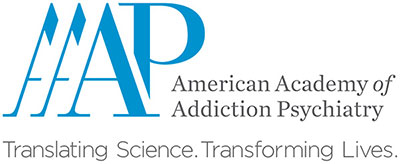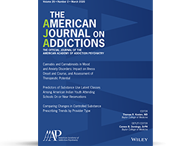
Rancho Bernardo Inn
17550 Bernardo Oaks Dr
San Diego, CA 92128
Mini-Symposia
The Mini-Symposia will last 60 minutes each and will be held in the Main Ballroom. This session is added to highlight more of the latest scientific evidence and innovations for substance use disorders treatment.
Emerging Cannabis Research and Treatment for Psychiatric and Other Priority Populations
Chairperson: Dana Rubenstein, medical student at Duke University School of Medicine
Co-Chair: Tony George, MD, Professor of Psychiatry at the University of Toronto and Clinician-Scientist at CAMH in Toronto, Canada
Presenters: Dana Rubenstein, medical student at Duke University School of Medicine; Tony George, MD, Professor of Psychiatry at the University of Toronto and Clinician-Scientist at CAMH in Toronto, Canada; Ryan Sultán, MD, Assistant Professor of Clinical Psychiatry in the Department of Psychiatry at Columbia University Irving Medical Center/New York State Psychiatric Institute; and Howard Padwa, PhD, health services and qualitative researcher at UCLA’s Integrated Substance Abuse Programs (UCLA-ISAP)
Discussant: Frances Levin, MD, Kennedy-Leavy Professor of Psychiatry at Columbia University and Chief of the Division on Substance Use Disorders at the New York State Psychiatric Institute
Moderator: Larissa Mooney, MD, Professor of Clinical Psychiatry and Director of the Addiction Psychiatry Division in the Department of Psychiatry and Biobehavioral Sciences at UCLA
With increasing legalization and societal acceptability, cannabis use is increasingly prevalent. To date, 39 US states have legalized cannabis for either medical and/or recreational use, and this number is growing. The consequences of cannabis use are not yet fully understood, but available data indicate that while occasional cannabis use may offer analgesic benefit for some individuals, others struggle with adverse effects such as cannabis use disorder (CUD), cannabinoid hyperemesis, or incident or emerging psychosis. Certain patient populations are uniquely susceptible to cannabis use and/or its negative consequences. People with mental illness are significantly more likely to use cannabis and develop CUD. Furthermore, certain racial/ethnic minoritized populations are at a higher risk of co-use of cannabis and tobacco as well as exclusive cannabis use. Youth and adolescents are another priority population at high risk for both cannabis use and negative associated consequences over the lifespan. In an era of increasing legalization, Addiction Psychiatrists must be knowledgeable about and attuned to clinical implications of policy changes, individual patient risk factors, and treatment methods for problematic cannabis use. This symposium will present epidemiologic data, policy-to-practice implications, and cutting-edge evidence-based treatments for cannabis use disorder in priority populations such as people with psychiatric illness, racial/ethnic minoritized populations, and youth.
Learning Objectives
- Discuss disparities in cannabis use and cannabis and tobacco co-use by race/ethnicity and psychiatric comorbidity in the era of cannabis legalization in the US and Canada.
- Describe the current prevalence of recreational cannabis use among US adolescents and associated mental health, academic, and social outcomes.
- Understand the rationale and preliminary results of an evidence-based brain stimulation intervention for cannabis use disorder in schizophrenia.
Mindfulness and Opioid Use Disorder: Primary Outcomes of Five RCTs with Effects on Substance Use, Craving, Pain, Mental Health, and Potential Mechanisms
Chairperson: Zev Schuman-Olivier, MD, Assistant Professor of Psychiatry at Harvard Medical School
Presenters: Eric Garland, PhD, LCSW, Distinguished Endowed Chair in Research, Distinguished Professor, and Associate Dean for Research in the University of Utah College of Social Work and Director of the Center on Mindfulness and Integrative Health Intervention Development (C-MIIND); Nina Cooperman, PsyD, Associate Professor in the Division of Addiction Psychiatry at the Rutgers Robert Wood Johnson Medical School, Chair of Treatment and Recovery at the Rutgers Addiction Research Center; Cynthia Price, PhD, MA, LMT, Research Professor at the University of Washington School of Nursing; and Zev Schuman-Olivier, MD, Assistant Professor of Psychiatry at Harvard Medical School
Discussant: Roger D. Weiss, MD, Professor of Psychiatry at Harvard Medical School and Chief of the Division of Alcohol, Drugs, and Addiction at McLean Hospital in Belmont, Massachusetts
Mindfulness cultivates non-judgmental present moment awareness and is an integrative behavioral approach spreading rapidly within addiction treatment and recovery. Studies demonstrate reduced craving and protective effects during relapse prevention for substance use disorders. Digital mobile apps have mainstreamed brief meditation practices, expanding usage of mindfulness in addiction recovery communities. Until recently, no large clinical trials have investigated the effects of evidence-based mindfulness interventions during opioid use disorder (OUD) treatment. Medication-based treatments (e.g., methadone, buprenorphine, naltrexone) are an effective first-line treatment for people with OUD. In 2018, NIH HEAL launched the BRIM program (Behavioral Research to Improve Medication-Based Treatment) to support research assessing if behavioral interventions can improve medication-based treatment for OUD, by testing the effectiveness of combining medications with evidence-based behavioral interventions (e.g., mindfulness). This symposium will be the first presentation of the primary and secondary outcomes of three recent BRIM-funded RCTs focused on mindfulness and OUD. We will first review recent federally-funded RCTs on mindfulness for reducing opioid misuse during prescription opioid treatment for chronic pain, then we will present the main outcomes of three BRIM RCTs: 1) online group mindfulness during methadone maintenance; 2) individual mindful body awareness during buprenorphine treatment; and 3) national RCT among people prescribed buprenorphine for OUD comparing remotely delivered live-online groups (trauma-informed mindful recovery versus recovery support). The symposium will describe effects on opioid use, craving, common co-morbidities (anxiety, pain, substance use, trauma), and neurophysiological and psychological mechanisms. Study design limitations, methods for optimal trauma-informed delivery, and implications for MOUD will be described.
Learning Objectives
- Summarize the evidence-base for mindfulness in treating opioid use disorder, while addressing craving and common OUD co-morbidities (including anxiety, pain, trauma, and substance use)
- Recall the definition of mindfulness, the basic format of evidence-based, clinical mindfulness approaches, and key factors for integrating mindfulness into Medication for Opioid Use Disorder (MOUD) treatment.
- Identify potential neurophysiologic and psychological mechanisms for mindfulness in OUD treatment and recovery.
Addiction Psychiatry Annual REVIEW: 2023 Highest Impact Publications
This new 90-Minute Session in the Main ballroom will highlight the 2023 Highest Impact Publications.
Chairperson: Carla Marienfeld, MD, DFAPA, FASAM, Clinical Professor at the University of California San Diego
Co-Chair: Brian Hurley, MD, MBA, FAPA, DFASAM, Medical Director of the Division of Substance Abuse Prevention and Control in the Los Angeles County Department of Public Health
Presenters: Brian Hurley, MD, MBA, FAPA, DFASAM, Medical Director of the Division of Substance Abuse Prevention and Control in the Los Angeles County Department of Public Health; Joshua D. Lee, MD, MSc, Professor in the Department of Population Health and Dept. Medicine/General Internal Medicine and Clinical Innovation at the NYU Grossman School of Medicine; and Carla Marienfeld, MD, DFAPA, FASAM, Clinical Professor at the University of California San Diego
Discussants: Ismene Petrakis, MD, Chief of Mental Health Services at VA Connecticut Healthcare System (VACHS) and Professor of Psychiatry at Yale School of Medicine; Frances Levin, MD, Kennedy-Leavy Professor of Psychiatry at Columbia University and Chief of the Division on Substance Use Disorders at the New York State Psychiatric Institute; and Edward Nunes, MD, Professor of Psychiatry at Columbia University Irving Medical Center and Research Psychiatrist at New York State Psychiatric Institute
Moderator: John A. Renner, Jr., MD, Professor of Psychiatry, at Boston University School of Medicine, and Associate Chief of Psychiatry for the VA Boston Healthcare System
This symposium proposal seeks to provide an annual review of the highest impact peer-reviewed publications and newsmaker events across the field of Addiction Psychiatry from 2023. The goal of this session is to provide concise, critical summaries of the most important peer-reviewed publications and newsmaker events of the past year, organized using key topic areas such as addiction neurobiology, epidemiology, pharmacology, intoxication and withdrawal syndromes, screening and diagnosis, mutual help, harm reduction, dual diagnoses, and pharmacologic and behavioral interventions. We will provide more in-depth focus on a small, select group of articles that are high impact and likely to fundamentally change clinical practice. The Chairs and Presenters will survey the most prominent medical, psychiatric, and addiction journals as well as newsletters to select and rank recent articles by publication metrics (Journal Impact Factor, Most Downloaded and Most Viewed, and Altmetric scores), expert opinion, and topic focus. Articles will cover key events and topics in Addiction Psychiatry from 2023. The Panel of Discussants is comprised of senior AAAP leaders and experts to provide commentary on the articles and engage in audience questions and discussion.
Learning Objectives
- Increase awareness of key studies in the field of Addiction Psychiatry from the year 2023.
- Increase working knowledge of key findings from recent cutting edge or important research in Addiction Psychiatry.
- Discuss the clinical utility and methods for applying the knowledge and findings from key research articles in Addiction Psychiatry.



